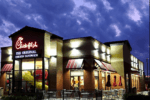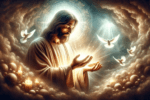On Thursday, the theater doors flung open. The dream was over now. There was no thought of making an impact or changing the world. It was now about survival. How could we help our church stay intact?
As the days became weeks, it became clear that our church was made up of strong families who truly were connected to one another. It is a community akin to a small Midwestern town. So what if the mayor is gone? We’re all still here. I watched men and women rally together in a heroic display of Christ-like love.
It wasn’t long before the shock of scandal gave way to the discomfort of introspection. This was ultimately not about a fallen pastor; it was about fallen nature, a nature we all have lurking within us. It became less about the worst being true about him, and more about the worst being true about us. We began to allow the Lord to turn His spotlight, one more piercing than the light of any cameras, on our own hearts. Secret sins, recurring temptations, hidden pride all looked sinister in His light. There was no such thing as a little white anything. Every weakness was now a dangerous monster with the potential of ruining our lives. Couples began to have difficult conversations with each other, friends became more vulnerable than they had ever been. Honest was the new normal. That sounds so strange to say.
But far beyond discussions and confessions, one question, one I never thought I would have trouble answering, relentlessly worked its way to my core. It surfaced from the pages of Henri Nouwen’s book, In the Name of Jesus. Nouwen had been an influential theology professor at Harvard, living at what most would have considered the apex of his career. But something was wrong.
“After twenty years in the academic world as a teacher of pastoral psychology, pastoral theology, and Christian spirituality, I began to experience a deep inner threat. As I entered into my fifties … I came face to face with the simple question, ‘Did becoming older bring me closer to Jesus?’ After twenty-five years of priesthood, I found myself praying poorly, living somewhat isolated from other people, and very much preoccupied with burning issues.“
But Nouwen’s inner wrestling was largely unnoticed by those around him, which made it more difficult for him to accurately gage the condition of his heart.
“Everyone was saying that I was doing really well, but something inside was telling me that my success was putting my own soul in danger. I began to ask myself whether my lack of contemplative prayer, my loneliness, and my constantly changing involvement in what seemed most urgent were signs that the Spirit was gradually being suppressed. … I was living in a very dark place and … the term ‘burnout’ was a convenient psychological translation for spiritual death.“
Haunted by the emptiness of his own spiritual walk, Nouwen started on a journey that eventually led to his resignation from Harvard. He took a position as a chaplain at Le Arche, a care facility for the handicapped. There he learned what it meant to live out a life of love and servanthood, to live as Christ among the broken, to truly “lead in the name of Jesus.” I had read his profound and honest reflections years before, but as I reread them in the wake of the scandal, I found myself convicted. Nouwen’s question dealt with something deeper than sin; it was about the essence of the Christian life, the thing we must have above all else.
I remember sitting with a few friends in my living room on New Year’s Eve, reflecting on how insane 2006 had been. We decided to have a little dessert and ponder the year that was now in its closing hours. Each couple took turns reviewing highs and lows of the year. For the most part, it had been a good year. Bigger and better opportunities, unexpected financial success, the births of healthy children, and the accelerated elimination of debt were some of the items on the good list. But we had also experienced Thursday, and “bigger and better” now seemed as days long ago, auld lang syne. The events of that day in November now overshadowed everything the next year might hold. Everything was good now, but how long would it continue? Would the things that had gone awry last year create repercussions that would undermine all the things we had held so dearly? For some, the fear of losing the jobs they loved was becoming a distinct possibility. The reality of how suddenly a curve in the road can appear was sobering us.








Leave a Comment
You must be logged in to post a comment.